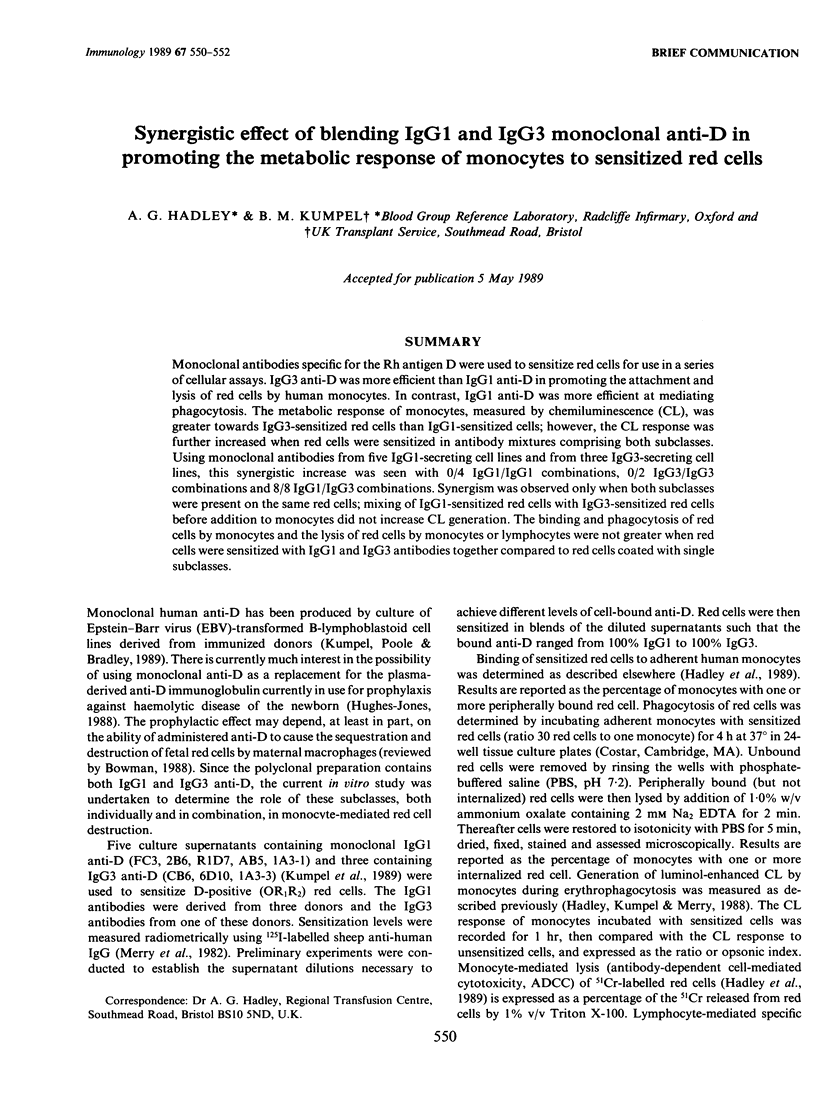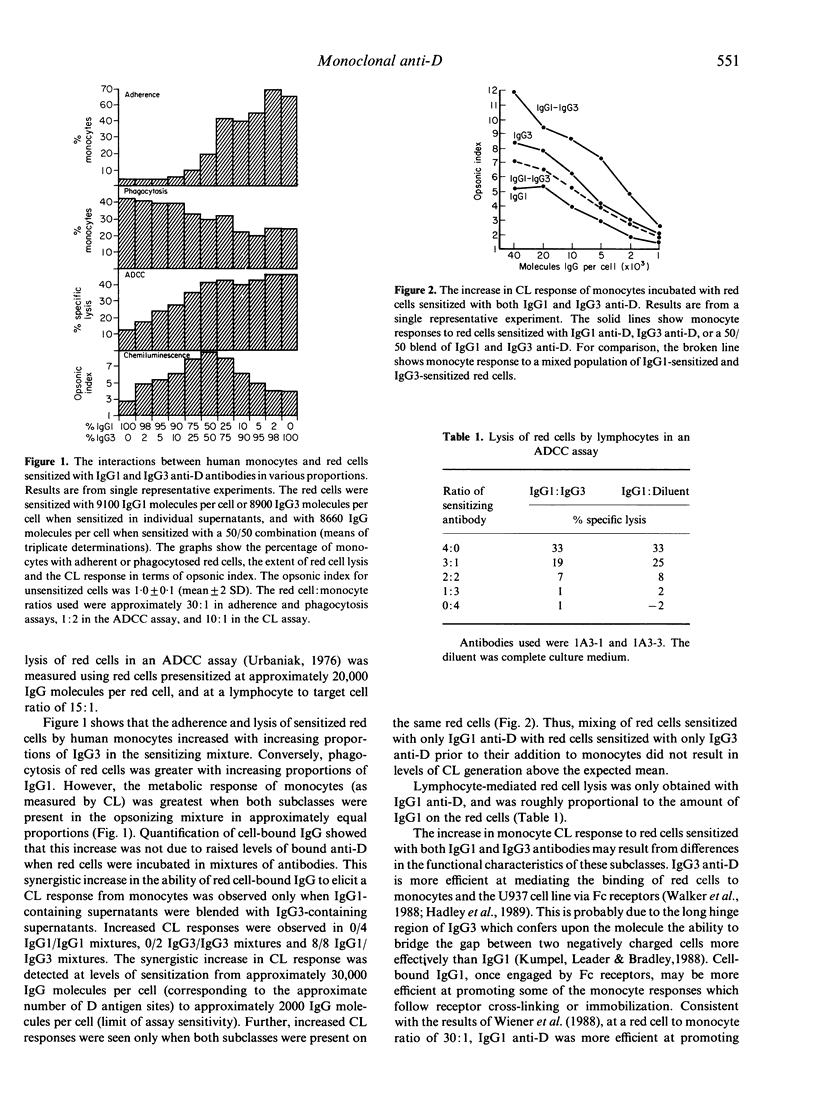Abstract
Monoclonal antibodies specific for the Rh antigen D were used to sensitize red cells for use in a series of cellular assays. IgG3 anti-D was more efficient than IgG1 anti-D in promoting the attachment and lysis of red cells by human monocytes. In contrast, IgG1 anti-D was more efficient at mediating phagocytosis. The metabolic response of monocytes, measured by chemiluminescence (CL), was greater towards IgG3-sensitized red cells than IgG1-sensitized cells; however, the CL response was further increased when red cells were sensitized in antibody mixtures comprising both subclasses. Using monoclonal antibodies from five IgG1-secreting cell lines and from three IgG3-secreting cell lines, this synergistic increase was seen with 0/4 IgG1/IgG1 combinations, 0/2 IgG3/IgG3 combinations and 8/8 IgG1/IgG3 combinations. Synergism was observed only when both subclasses were present on the same red cells; mixing of IgG1-sensitized red cells with IgG3-sensitized red cells before addition to monocytes did not increase CL generation. The binding and phagocytosis of red cells by monocytes and the lysis of red cells by monocytes or lymphocytes were not greater when red cells were sensitized with IgG1 and IgG3 antibodies together compared to red cells coated with single subclasses.
Full text
PDF


Selected References
These references are in PubMed. This may not be the complete list of references from this article.
- Fleer A., Roos D., von dem Borne A. E., Engelfriet C. P. Cytotoxic activity of human monocytes towards sensitized red cells is not dependent on the generation of reactive oxygen species. Blood. 1979 Aug;54(2):407–411. [PubMed] [Google Scholar]
- Fleer A., van Schaik M. L., von dem Borne A. E., Engelfriet C. P. Destruction of sensitized erythrocytes by human monocytes in vitro: effects of cytochalasin B, hydrocortisone and colchicine. Scand J Immunol. 1978;8(6):515–524. doi: 10.1111/j.1365-3083.1978.tb00551.x. [DOI] [PubMed] [Google Scholar]
- Hadley A. G., Kumpel B. M., Leader K., Merry A. H., Brojer E., Zupanska B. An in-vitro assessment of the functional activity of monoclonal anti-D. Clin Lab Haematol. 1989;11(1):47–54. doi: 10.1111/j.1365-2257.1989.tb00173.x. [DOI] [PubMed] [Google Scholar]
- Hadley A. G., Kumpel B. M., Merry A. H. The chemiluminescent response of human monocytes to red cells sensitized with monoclonal anti-Rh(D) antibodies. Clin Lab Haematol. 1988;10(4):377–384. doi: 10.1111/j.1365-2257.1988.tb01184.x. [DOI] [PubMed] [Google Scholar]
- Hughes-Jones N. C. Human monoclonal antibodies and haemolytic disease of the newborn. Br J Haematol. 1988 Nov;70(3):263–265. doi: 10.1111/j.1365-2141.1988.tb02479.x. [DOI] [PubMed] [Google Scholar]
- Kumpel B. M., Poole G. D., Bradley B. A. Human monoclonal anti-D antibodies. I. Their production, serology, quantitation and potential use as blood grouping reagents. Br J Haematol. 1989 Jan;71(1):125–129. doi: 10.1111/j.1365-2141.1989.tb06285.x. [DOI] [PubMed] [Google Scholar]
- Urbaniak S. J. Lymphoid cell dependent (K-cell) lysis of human erythrocytes sensitized with Rhesus alloantibodies. Br J Haematol. 1976 Jul;33(3):409–413. doi: 10.1111/j.1365-2141.1976.tb03558.x. [DOI] [PubMed] [Google Scholar]
- Walker M. R., Kumpel B. M., Thompson K., Woof J. M., Burton D. R., Jefferis R. Immunogenic and antigenic epitopes of immunoglobulins binding of human monoclonal anti-D antibodies to FcRI on the monocyte-like U937 cell line. Vox Sang. 1988;55(4):222–228. doi: 10.1111/j.1423-0410.1988.tb04701.x. [DOI] [PubMed] [Google Scholar]
- Wiener E., Jolliffe V. M., Scott H. C., Kumpel B. M., Thompson K. M., Melamed M. D., Hughes-Jones N. C. Differences between the activities of human monoclonal IgG1 and IgG3 anti-D antibodies of the Rh blood group system in their abilities to mediate effector functions of monocytes. Immunology. 1988 Oct;65(2):159–163. [PMC free article] [PubMed] [Google Scholar]


